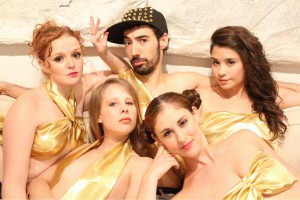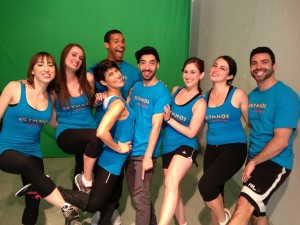Gymnos: A Geek's Tragedy blends two of my favorite things: Ancient Greek theater and working out. However, in this work, the mixture is an uneasy one. The world of gym rats seems to have no room for someone of intellectual inclinations and the so-called "geek" — a successful playwright with a chance at Broadway — cannot make himself fit in the world of fitness freaks. The at times funny play written by Nina Mansfield and directed by Adyana de la Torre, currently playing at HERE Arts Center, misses the mark when it comes to the important crossroads between betterment of the mind and improvement of the body.
The plot, at most points during the production, is both difficult to ascertain and seemingly irrelevant. The thin storyline centers around the aforementioned dramatist on a deadline: he owes a script in a week. At the same time, he is being haunted — or more precisely harassed — by a series of muses who, rather than inspiring his imagination, suggest he engage in matters of physical exercise. They justify this by referring to a former love interest of his, Helen, ostensibly based on the historical "face that launched a thousand ships," and with whom he failed romantically both due to a lack of confidence and a lack of well-defined abs. From there, we follow our seemingly self-appointed hero through his series of herculean trials: from one bizarre, oppressive gym to the next.
The performances are uneven at best, and although I understood the abundance of actors on stage to be standing in for a Greek chorus, they often do little more than make the world of the drama seem cluttered. It is hard to root for the hero, as his challenge appears to benefit no one but himself, and even there, he does not seem to care all that much.
The best sequences incorporate dance; I found myself wishing more of the play actually staged the fitness experience as opposed to the time spent in the gymnasium itself. The play does pick up in the second act and the highlight of the production is de la Torre's brief on stage performance as a zealous Zumba instructor. The worst parts are the overwhelmingly vulgar humor, which, though at first laugh-out-loud funny, wears out its welcome from overuse and becomes more awkward than raucous fun.
Both the lighting and set are fine, and the costumes do appropriately fit the world of the play. Unfortunately, no aesthetic element is enough to compensate for this ultimately self-serving production. The protagonist is not likeable enough to propel the story forward, nor is the text, even comedically, rich enough to carry an otherwise undramatic spectacle to any sort of fulfillment. The space between body and mind is explored in this play but, in the end, left as disconnected as it was at the beginning.



